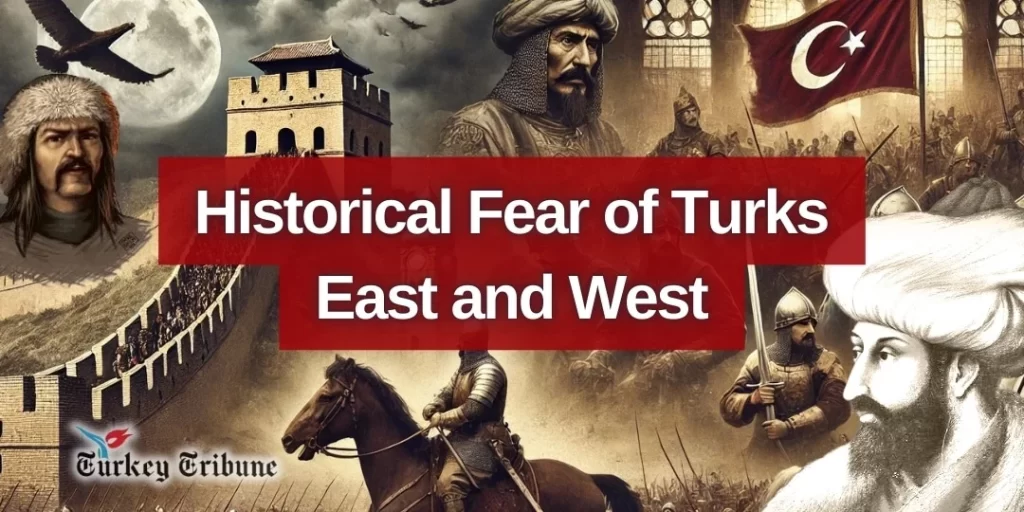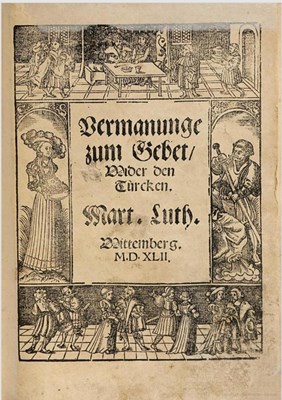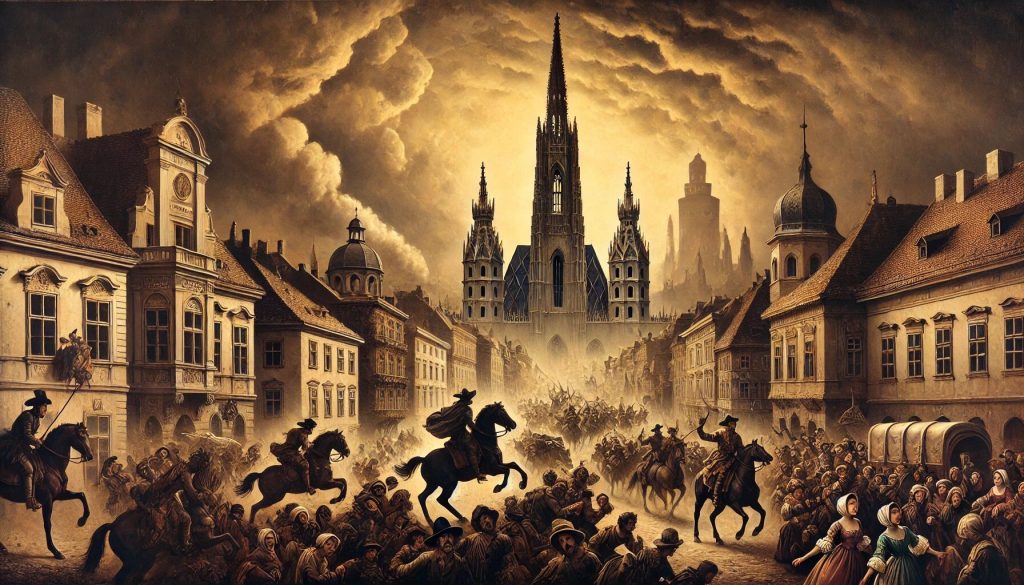As is well known, the Great Wall of China is one of the seven wonders of the world. It is so large that it is the only structure on Earth that can be seen from the Moon. The Chinese are very proud of this wall. They take all visitors to their country to see it. Why did the Chinese build this great wall that they are so proud of? Out of fear of Turks!…

In the 15th-16th centuries, there was a great “fear of Turks” in the West as well as in the East. Namely, in August 1540, the Ottoman Sultan Suleiman the Magnificent set out on a campaign. He took Budapest in the first week of September. He completely dominated Hungary. There was great excitement and panic in Germany. The German Prince, who was very afraid of this, ordered Martin Luther, the founder of Protestantism, to write “Call for Prayer Against the Turk” (Vermeanung Zum Gebet Wider den Türcken) on September 8, 1541:
“The Turks chased away the Austrian troops who had taken Buda and Pest, inflicting a heavy defeat on them, and drove a great mass of people towards Austria. The Turkish sultan is also on his way to Hungary. There is no obstacle there that can stop the Turks. This is a cause for great fear and sadness. What is more worrying is that the Turkish sultan will not stop at Buda and Pest. He will continue his campaign to Austria and Vienna. Not only the countries in the region, but also the entire Christian world. Especially the German nation, will suffer irreparable damage and distress, and perhaps even be in danger of collapse.”
The Only Solution: Prayer!
The Prince also draws attention to the following points: “The preachers in the Principality of Sachsen should absolutely in all their speeches invite and encourage the people to pray for deliverance from the present Turkish danger.”
M. Luther was actually prepared for this service. He agreed with the Prince. As a matter of fact, in his letter dated August 14, 1541, written to a German who advised him and struggled against the dangers. He said: “First of all, we must understand and say that we have committed a sin that requires punishment by the Turks. We must obey God’s commandments; we must first take to heart the ‘Vaterunser’ (an important Christian prayer), which is the foundation of our faith, and then we must strike, we must risk everything that can be risked.”

M. Luther also expressed his despair as follows: “I have neither the strength nor the hope to pray for victory over the Turks; I can only beseech God to help save what can be saved.”
In order to raise the necessary funds for the war against the Turks, Luther asked the German Kaisers to impose a tax, the “Turkish tax”, when they deemed it necessary. The tax was not welcomed by the people. Negative attitudes against this tax are seen from time to time. Luther does not justify such reactions and defends the view that “one should both pay the tax and participate in the war as a soldier”.
“Let anyone who wants to resist the Turks pray!“
M. Luther also expresses the futility of fighting the Turks as follows: “Let anyone who wants to resist the Turks pray! Our walls, cannons and all our serfs can do nothing to them. I say to our builders: ‘The Turks, against whom our Paternoster (a Christian prayer) can do nothing, your walls will not withstand them at all, they and the devil are powerless. The Turk will take even a city or a country surrounded by iron walls. We would be left without food and starve to death!… The Turk is extraordinarily strong. Therefore, defense against the Turk is impossible. Stop defending, and pray to God to protect us.”
M. Luther lashed out at Germans who preferred to be under Turkish rule rather than live under German subjects, saying, “Desiring Turkish rule is one of the greatest sins. Those who curse their own rulers and run to the Turks can never live among them with a clear conscience. Those who voluntarily join the Turks become their friends and accomplices. A Christian should rather die twice under his own rule than mingle with the Turks, the bloody dog.”
Character of the Turks
In his works, M. Luther not only portrayed the Turks as very despicable and inferior, but also wrote the following statements:
“Turks are honest, disciplined and respectable people in appearance. They do not drink wine, they do not eat and drink immoderately as we do, they do not dress lightly and expensively, they do not build magnificent buildings, they are not proud, they do not swear or curse. They are extremely obedient and virtuous to their rulers.”
Luther also says the following about the Turkish clergy: “One of the most frightening and evil things about the Turks is that they have clergy who lead a serious, honest and disciplined life. These clergy are more like angels than men. It is impossible to compare them with the priests and bishops of the Papacy. Turkish clergymen are sometimes ecstatic, they are as if they are dead, and sometimes they show marvelous behavior. Who would not be frightened and impressed by this!”
M. Luther stated that the difficulty of defeating the Turks was due to their way of life rather than their military power and said, “Whatever our fate is, it will befall us. The Turks say and believe that no one dies until the hour comes. Therefore, Turks are very bold. It is impossible to convert a Turk from his religion. They believe that they are always right and just”.
‘Lord, grant us peace’.
The German theologian goes on to say, “In order to eliminate the Turkish danger, one should pray against the Turks with the same belief.” “The people should be careful to fulfill their religious duties, and after the sermons, ‘Psalms’ (prayers recited in chorus in church) should be read. After all this has been done, one of the people should say, ‘Lord, grant us peace’. The regular practice of these prayers in the churches is enough to get rid of the Turks.”
- Exposing the Western Double Standards and Media Games, Ömer Faruk Güler
It can be seen that M. Luther’s message to the German people was that victory over the Turks was impossible and that they should only pray. He said, “God sent the Turks upon the Germans to crush them because of the cruel, interest-bearing, irreligious and wicked rulers who robbed their country blind. He will continue to do so until they are cleansed of their sins”.
Luther’s “Call to Prayer against the Turk” was completed on September 15, 1541. In the same year, it was printed twice in Wittenberg, Nuremberg and Ausburg. In 1542 it was printed in large numbers in important German cities such as Strasbourg and Wittenberg. It was translated into Latin. Thus, it was spread all over Europe. It was reprinted continuously in the following years. The original text of this work is in the Heidelberg University Library.
Turkish Army Has Never Seen Defeat
The observations and thoughts of Busbecq, the head of the German Emperor’s Embassy Delegation, who arrived in Istanbul in 1553, about Turkey are also very remarkable. While expressing his admiration for the faith, order, sacrifice and cleanliness he saw in the Turkish army, he complained about the poverty, laziness, lack of faith, lack of spirituality, lack of discipline and perseverance of the army, cruelty of the officers, debauchery, drunkenness and gambling that prevailed in his own country and said, “The Turkish army has never been defeated, has gained experience, is patient, orderly and always sings songs of victory; accustomed to glory and honor and believing in an auspicious future, it has acquired great resources from Persia to Hungary”.

Busbecq’s “Is there any doubt about the end of this course? Our situation is well known; what a terrible thing, my God! When I compare the current system of the Turks with our own system, I think of the disasters that the future will bring upon us. I tremble and fear our fate” expresses the difference in power between the Ottoman Empire and Europe.
Hayrullah Efendi, one of the Ottoman statesmen, says in his book “European Travelogue”: “When a strong wind blows in Vienna, they say, ‘It blew like a Turk’ as a metaphor for the Turkish raiders coming like lightning. They used to scare the children by saying ‘The Turk is coming’, just as they used to scare them that the bogeyman was coming.”
In 1534, an office was created in St. Stephen’s Cathedral in Vienna to announce the approach of Ottoman raiders by ringing a bell. This office was abolished in 1956 by the Vienna City Council, which decided that “since there was no longer an Ottoman danger, this duty was no longer necessary.” (Yılmaz Öztuna)
“They Turned Churches Into Mosques”
Unfortunately, the descendants of the Ottoman raiders who made Germany and Austria tremble with their horses in the 15th century rode to Europe in the 20th century with wooden suitcases and black trains as workers. Thousands of Anatolian Turks, most of them primary school graduates, who did not speak the language, did not know the way, worked tirelessly in mines, factories and the heaviest labor, and did not assimilate. They bought churches and synagogues and turned them into mosques. They built many mosques with domes and minarets.
The children of the second-third generation studied, learned German very well, started businesses and became bosses. Now they employ Germans in their companies and give them jobs. They maintained strong ties with their homeland, ensuring they visited every vacation. During their visits, villages and houses were built with care and dedication. This unwavering connection allowed them to contribute significantly to the development of our country. Today, if the Turkish nation is taught its religion. Taught its history and language correctly, there is no doubt that it will once again be worthy of its ancestors.















